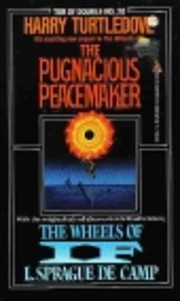

Cliquer sur une vignette pour aller sur Google Books.
|
Chargement... The Pugnacious Peacemaker/The Wheels of If (1990)par Harry Turtledove, L. Sprague De Camp Aucun Actuellement, il n'y a pas de discussions au sujet de ce livre. aucune critique | ajouter une critique
Appartient à la série éditorialeTor Double (20)
Aucune description trouvée dans une bibliothèque |
Discussion en coursAucun
 Google Books — Chargement... Google Books — Chargement...GenresClassification décimale de Melvil (CDD)813Literature English (North America) American fictionClassification de la Bibliothèque du CongrèsÉvaluationMoyenne: (3.86) (3.86)
Est-ce vous ?Devenez un(e) auteur LibraryThing. |
|||||||||||||||||||||||||||||||||||||||||||||||||||||||||||||||||||||||||||||||||||||||||||||||||||||
"The Wheels of If" -- On a historical level it's notable for being, I believe, one of the first alternate world stories. But it also works for the modern, naive reader. One can quibble, as you always can in alternate world stories, over the author's speculations on what may have happened in history if a couple of events had turned out differently. Interestingly, de Camp picked two turning points seldom, if ever, used in alternate world stories even now: Arabs winning the Battle of Tours -- a battle whose importance is widely recognized, and the obscure event of King Oswiu of Northumbria choosing not to accept Rome's authority over the Celtic Church. Would the Indians have adopted European technology and military tactics? Wouldn't they (as William MacNeill pointed out in Plagues and People) been wiped out by European disease even if European gunpowder wasn't around? Would this world's paralimentary procedure and legal system so closely match our own? But one can argue many interpretations of history with equal validity much less the speculations of alternate history. Also, historical knowledge, theories, and interpretations change through time. This story, after all, is 50 years old. On a fiction level, you can argue this story is a tale of relatively straight forward political machinations with little exploration of a culture that is, in many ways, conveniently like our own. In many ways, but not all. Some cultural differences are quite jolting and surprising to us and hero Allister Park: the obscenity of the publicly exposed navel on an otherwise nude beach and the terror of dueling with a man lashed to you in an officially sanctioned duel. There's humor in this book and clever political scheming as Park teaches the people of this world a thing or two about politics. He's an enjoyable, interesting character, plausibly adaptable. His emotions and reactions at story's beginning are interesting and plausible. I liked his reactions to other people. He treats them ok but is realistically concerned with himself. I like him staying on in the alternate world because he's been offered a judgeship -- a job he only hoped to get in our world. I liked the generous helping of de Camp's humor. I liked the idea of each person having 13 alternate selves somewhere in the infinitude of alternate universes. And I thought de Camp displayed impressive inventiveness with the language of his world. The speech is (at least in my quite limited knowledge) a good rendition of English without the enormous effect of the Norman conquest of England. Some of the word choices seem awkward compounds or strange synonyms for our accustomed words. You at first think de Camp is being implausible and giving us stilted dialogue just for effect than you realize the accustomed word is Latin in orgin and wouldn't be used in this setting. You are reminded constantly, by linguistics, that this is an alien universe.
"The Pugnacious Peacemaker" -- Harry Turtledove has said that L. Sprague de Camp's "Wheels of If" inspired him to become a professional historian. It was obviously an influential story on Turtledove's life -- from it he chose the profession of history and the type of sf he writes. This was probably an act of love to be allowed to write a sequel 50 years after "The Wheels of If" was published. How does Turtledove do? Well, he builds on de Camp's linguistic touches and adds even more plausible, non-Latin derived words into the English of the world. His humor is not as prevalent, as light as de Camp but still funny, and I liked that Eric Dunedin was treated as even more of a friend than in de Camp's story. Allister Park was just as much a ingenious wheeler and dealer in this story as in "The Wheels of If". He operates in the Astounding/Analog tradition of treating society as a system, a machine whose rules you can discover and manipulate like an engineer or scientist manipulates the natural world. In the typical Turtledove way, the outcome of the story involves introducing a technology to a culture. (Or, more accurately, a technology applied to a new end since the Incans seem to have writing but don't write down religious texts. Doing so gets them treated as Ahl al-Kitab, People of the Book, by the Arabs. No longer are they mere pagans but must be dealt with respect.) His Incan setting was rather interesting. All in all, though, I don't think Turteldove's effort is as good as de Camp's. It's not that de Camp's was first therefore having the advantage of novelty. It's that his has invention and a lighter pace. I think Turtledove spends a bit too much time on the Incan culture. On the other hand, he can't deal with Park's first reaction to traveling through parallel worlds since de Camp did already; Turtledove has to spend more time on the world, the cultures Park sees. His prose is a bit more leaden, slower and, even though it characterizes Park, he spends too much time on the ultimately superflous subplot of his romance with Kuurikwiljor. (